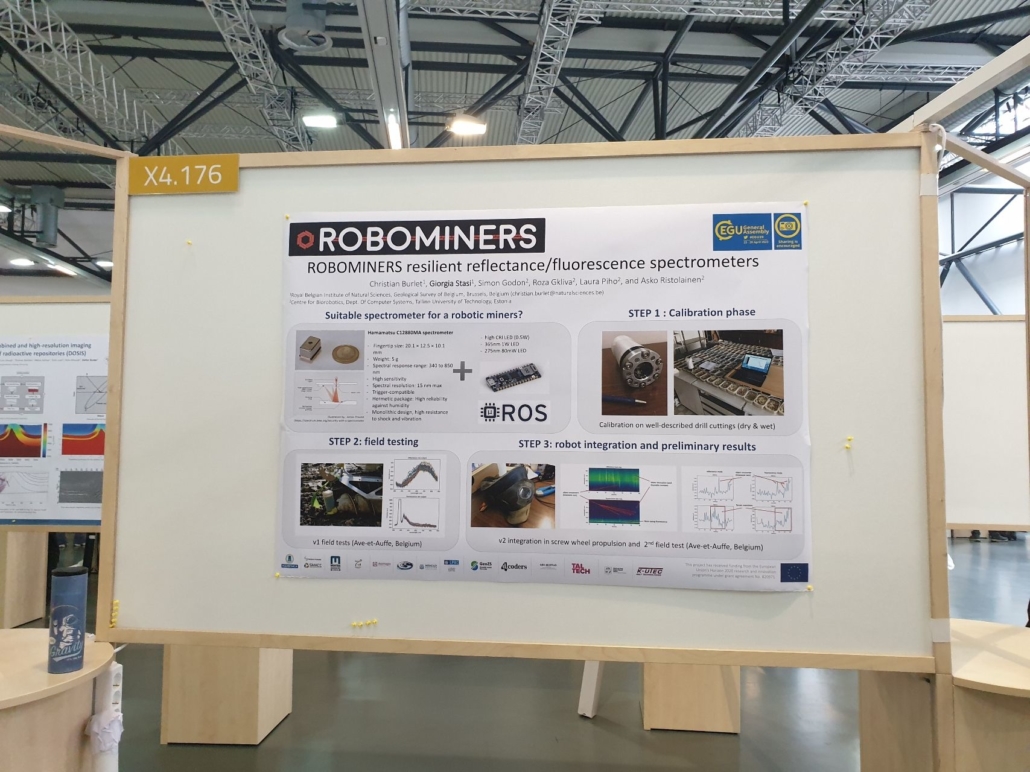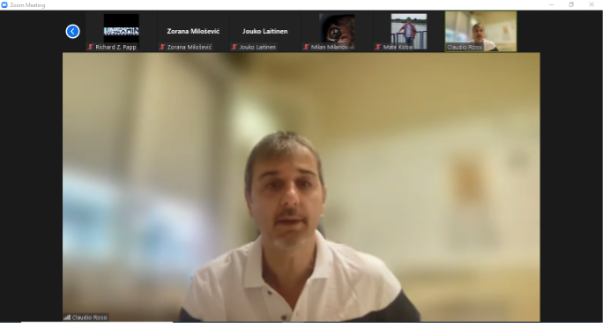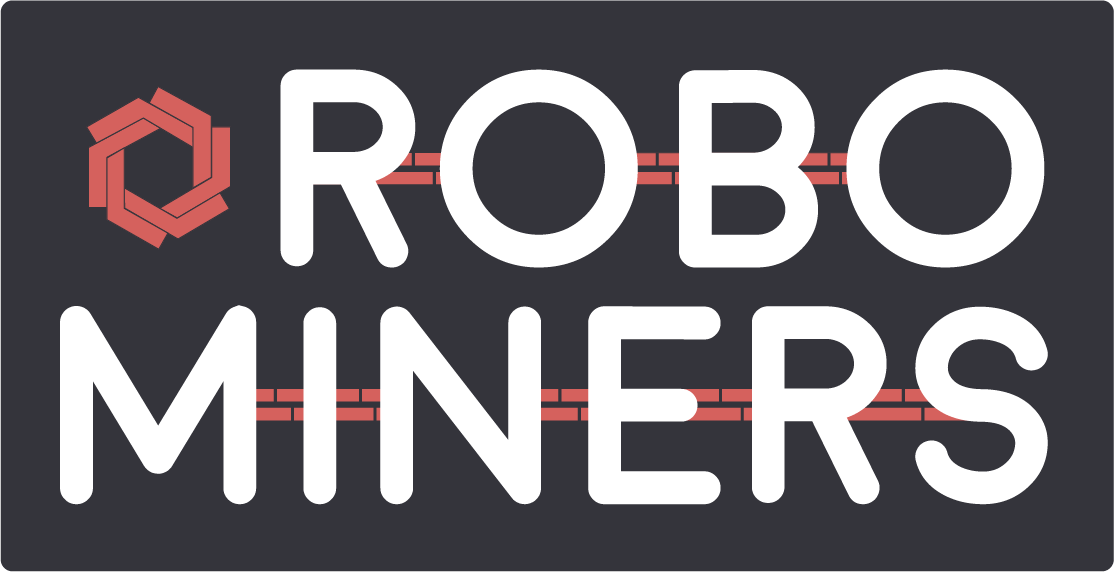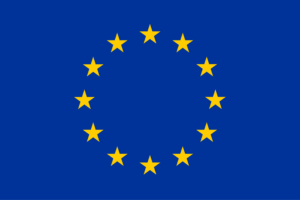The EU-funded ROBOMINERS project is set to embark on field trials from 31 July to 4 August 2023 in Kunda, Estonia. The trials will take place in an open-pit mine and will mark a significant milestone in the project’s mission to enhance European access to mineral raw materials and reduce import dependency.
ROBOMINERS partners had the chance to introduce our project at the annual EGU General Assembly in Vienna.
Consortium partners under the lead of Giorgia Stasi (Geological Survey of Belgium) convened a session entitled “Mining the future: new trends and technological advances in mining exploration and production // Novel developments in understanding the petrogenesis of REE resources: Modelling, experimental petrology, mineralogy, and geochemistry”.
Within this session, a poster on “ROBOMINERS resilient reflectance/fluorescence spectrometers” was presented.

As part of the ROBOMINERS sensor array development, a set of mineralogical and geophysical sensors are designed to provide the necessary data to achieve a “selective mining” ability of the miner to reduce mining waste production and increase productivity of a small mining machine. To achieve this, the robot should have the ability to react and adapt in real time to geological changes as it progresses through a mineralized body. This study focuses on a set of compact sensors designed for ultrahigh-resilience and continuous operation in high pressure/vibrations/temperature environment. They are based on reflectance/fluorescence measurements in the visible/near infrared range, using a broadband light source (tungsten-halogen lamps) in reflectance mode and 365nm UV LED in fluorescence mode.
The ROBOMINERS reflectance/fluorescence spectrometer “Mk1” was developed in collaboration with Taltech University. The spectrometer is built around a monolithic spectrometer (Hamamatsu C12800MA and a wifi capable microcontroller (Arduino RP2040 Connect).. As the ROBOMINERS prototype will be operated by ROS2 (Robotic Operating System v2 – https://www.ros.org/ ), we decided to implement a Micro-ROS publisher on the microcontroller.
The first field trials of the sensor have been carried out in the entrance of abandoned mine (baryte and lead mine, Ave-et-Auffe, Belgium), with the sensor integrated directly in the propulsion mechanism of the “RM3”’ ROBOMINERS prototype. This test allowed to demonstrate the immunity of the sensors to to shocks, water and dust with no measurable de-calibration of the spectrometer.
References.
Lopes, B. Bodo, C. Rossi, S. Henley, G. Žibret, A. Kot-Niewiadomska, V. Correia, Advances in Geosciences, Volume 54, 2020, 99–108
How to cite: Burlet, C., Stasi, G., Godon, S., Gkliva, R., Piho, L., and Ristolainen, A.: ROBOMINERS resilient reflectance/fluorescence spectrometers, EGU General Assembly 2023, Vienna, Austria, 24–28 Apr 2023, EGU23-12056, https://doi.org/10.5194/egusphere-egu23-12056, 2023.
ROBOMINERS is constructing a robotic miner which will facilitate EU access to mineral raw materials.
One of the main goals in 2023 is to prepare ROBOMINERS pilots for the year 2030, where the technology line should reach TRL 6/7 (system prototype demonstration in operational environment), with a first industrial pilot with tethered and semi-autonomous operation with on-site minerals processing and paste refilling.
Therefore, the ROBOMINERS team is actively searching for mines where its technology could be tested by 2030, to complement our existing database.
Are you aware of a potential pilot site?
Then please complete our survey: https://bit.ly/ROBOMINERSpilotsites
At the EGU2023 General Assembly (Vienna and online, 23-28 April 2023), there will be a scientific session convened by ROBOMINERS partners on Mining the future: new trends and technological advances in mining exploration and production ‘.
Research and innovation in exploration and mining of raw materials is increasingly focused on the prospect of developing new methods and technologies to reduce the environmental footprint of mineral extraction and exploration. The robotization of exploration/production platforms, such as robotic autonomous explorers and miners, will allow to reconsider “non-economical” deposits (abandoned, small, ultra-depth), and to open as well towards the autonomous exploration and exploitation of other non-terrestrial bodies, including asteroids and moons. Technological advances in the production process, included, but not limited to, X-ray sensors, hyper spectral techniques, LIBS, electromagnetic, combined with machine learning, AI models and efficient mechatronic solutions, will pave the way to a green mining industry.
We welcome contributions from researchers working on applied or interdisciplinary studies associated with mining exploration, geophysics, geochemistry, metallurgy, selective mining. We encourage interdisciplinary studies which use a combination of methods to solve challenges as diverse as, but not limited to, locomotion in water or slurries, localization and mapping in relationship with an orebody, automated extraction planning, optimization of extraction tools, and real-time selective mineralogy.
The session will include both oral presentations and posters, details of the abstract submission are described below.
CALL FOR ABSTRACTS IS NOW OPEN!
EGU2023 Session ERE 4.3: “Mining the future: new trends and technological advances in mining exploration and production “
✔ Visit CO Meeting Organizer EGU23 (copernicus.org) and take a look at the Provisional Programme.
✔For information on how to submit the abstract visit: https://egu23.eu/programme/how_to_submit.html
✔ Submit your abstracts at the following link: https://meetingorganizer.copernicus.org/EGU23/session/46424
Make sure you submit your abstract by 10th January 2023 at 13:00 CET!
A meeting with the representatives of the projects Pipebots, Unexup and Robominers was organised on 5 July 2022 as a follow-up after the clustering workshop held on 24 May 2022 with the same projects. The meeting was organised by the Pipebots project, back to back with the last Unexup project meeting. It was a hybrid event, held partially at the premises of the Geological Survey of Slovenia in Ljubljana and partially online. 14 participants joined online and 8 participants were present at GeoZS.
The aim of the meeting was to discuss:
- Research challenges that the projects face on robotics-related topics
- Funding opportunities for joint collaboration to solve common challenges
- Joint dissemination event to share with the community solutions and discuss the way forward

ROBOMINERS coordinator Claudio Rossi participating virtually in the clustering meeting.



